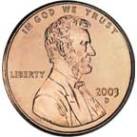Coinage Act of 1864
Appearance
The Coinage Act of 1864 was passed on April 22, 1864. The United States federal law changed the composition of the one-cent coin and authorized the minting of the two-cent coin. The Director of the United States Mint developed the designs for these coins for final approval of the Secretary of the Treasury. As a result of this law, the phrase "In God We Trust" first appeared, on the 1864 two-cent coin. An Act of Congress, passed on March 3, 1865, allowed the Mint Director, with the Secretary's approval, to place the phrase on all gold and silver coins that "shall admit the inscription thereon." In 1956, "In God We Trust" replaced "E Pluribus Unum" as the national motto. All currency was printed and minted with the new motto.[1]
| A US Penny (One Cent Coin) |
|---|

|
See also
- Coinage Act of 1792
- Coinage Act of 1834
- Coinage Act of 1849
- Coinage Act of 1853
- Coinage Act of 1857
- Coinage Act of 1873
- Coinage Act of 1965
References
- ^ "History of 'In God We Trust'". U.S. Department of the Treasury. Retrieved 3 October 2013.

